‘Just had to take a punt on myself’: How Liz Clay quit day job, grew personal brand to fund Olympic dream
Liz Clay was working in retail when she realised something had to give. The self-managed Olympian explains to SHANNON GILL how she unlocked the power of social media to make gains on and off the track.
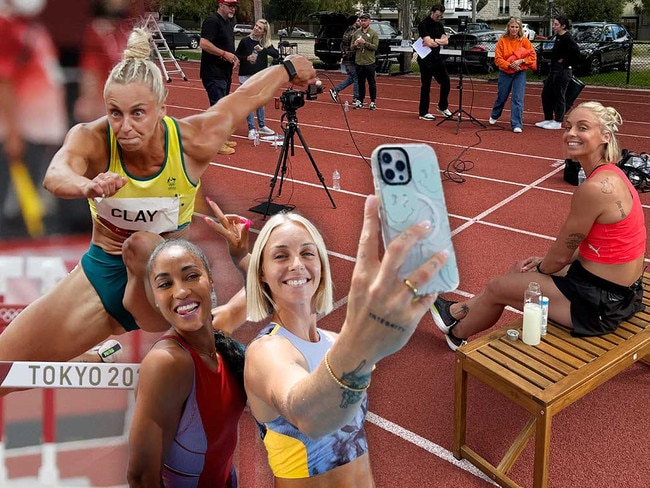
Olympics
Don't miss out on the headlines from Olympics. Followed categories will be added to My News.
As the morning sun bathes the track, this is where you would expect Liz Clay to be 100 days out from the Paris Olympics – arms pumping like pistons, bounding over hurdles with ease.
Yet this is strictly business.
Instead of her Gold Coast base, she’s in suburban Melbourne surrounded by cameras.
Clay knows that an Olympic year is as much a time to shine off the track as on.
“It’s this golden period of six to 12 months where you really need to try to say yes to everything,” she said.
“People find out about you, people hear about you, because track and field is getting mainstream media attention which it usually would not get.
“So you just have to capitalise on it from a business point of view.“
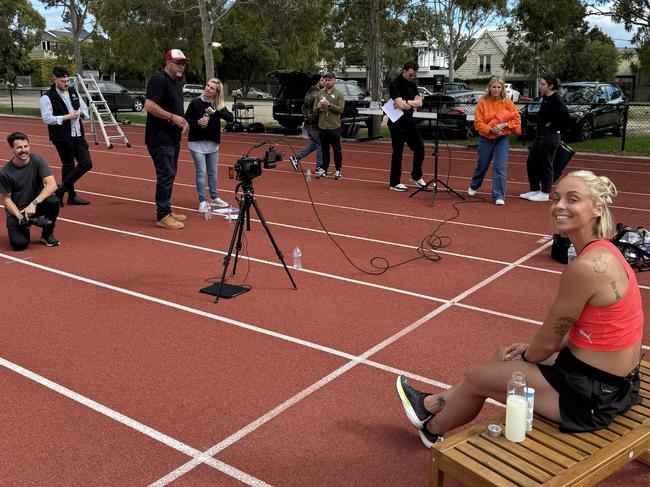
Today it’s her personal sponsor Voost vitamins, later in the week it will be Chemist Warehouse for Athletics Australia.
Far from this being a distraction to her main goal of following up her brilliant performance to reach the 100m hurdles semi-finals in Tokyo, the brand savviness fuels the dream.
“The personal sponsorships that I have basically enable me to focus on athletics solely and not have to work,” Clay said in a break from the shoot.
“It took a long time to get to this point but now I’m working with a couple of brands and can actually get solid 12- month contracts that take the pressure off in an Olympic year.”
While the big football codes hand teenagers the privilege of full-time professionalism on a platter, Clay’s long path there has been earned through her own initiative and the power of social media.
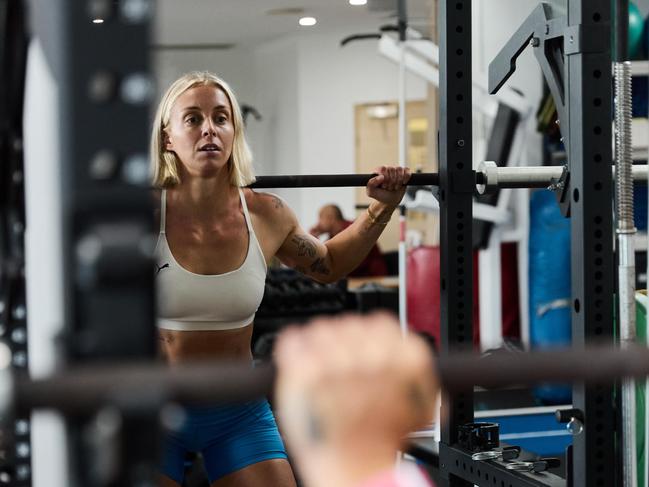
For most of Clay’s rise, she funded her athletic dreams via working a full-time job in retail.
“Everyone knows what that’s like,” she said. “You’re spending six to eight hours a day on your feet and I’d manage my work hours around training and then work weekends as well because you have to pay rent.
“There was a lot of stress balancing everything.”
Eventually Clay decided enough was enough.
As selection for Tokyo loomed, she quit her job to turn her own personal business model on its head.
Instead of working to fund her Olympic dream, she would attempt to turn the dream itself into a money-maker via social media.
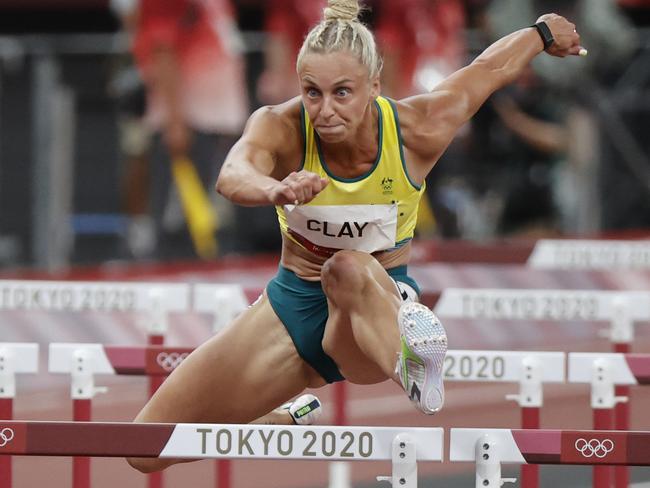
“I just said ‘right, I’m going to invest and pay a photographer to come and get good content’. That’s where I started, I just had to take a punt on myself.”
Initially it paid off on the track.
“The breakthrough kind of occurred around the time where I decided I wasn’t going to have retail work in my life anymore,” she said.
She was selected for Tokyo and after almost making the 100m hurdles final, the wider world discovered Clay’s Instagram page and her well-told story.
In the wake of that performance, she finally received the pay-off in her bank account.
“I’d get a direct message from a brand saying, ‘Hey, we’d love to send you X for free. You can try it out,’’’ she said.
“Instead of just saying ‘yes’, I’d say, ‘Hey, let’s jump on a call and talk through this further’.
“More often than not that would result in a longer and better deal.”
Puma was the first brand to jump on board before Tokyo and leading into Paris she now holds major contracts with that company, Voost vitamins and Whoop health and fitness brands.
The brands love her approach because, in comparison to most athletes, she’s so proactive in understanding why she’s being paid and creating the content they need.
“Financially, they’re a huge assistance,’’ Clay said.
“If all the sponsors were taken away, I would still be training my arse off and turning up to training as a professional athlete every day.
“But life would be so much harder.”
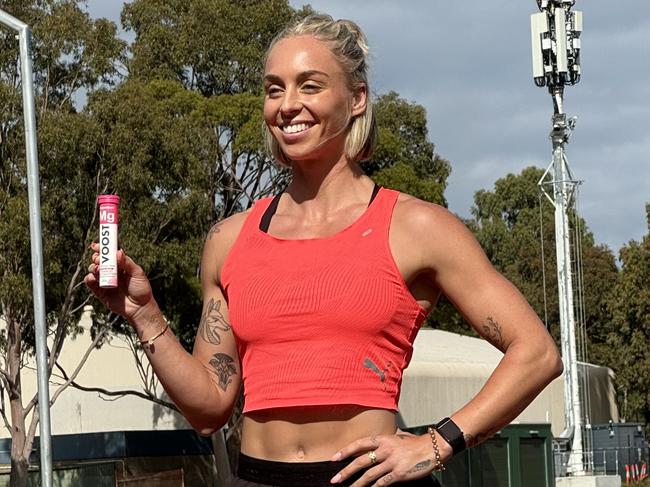
Clay is the prototype for the sporting world’s version of “girl boss”.
She manages herself and effectively runs her own brand – it has 127,000 followers on Instagram – as a business alongside her sporting pursuits.
“It’s a niche way of doing things,” she said.
“It took a while to build up and I had to invest a lot of money and time, but it’s also easy because I’m training anyway.
“I’m going to get great footage and turn it into a story or turn it into a motivational piece or turn it into something that can sell a product, when I’m doing the session anyway.”
A foot injury in 2022 put her out of the Commonwealth Games but she used the time off to further invest in what was working and tell the story of her fightback.
“I couldn’t run but I could still do content, so I invested even more money, time and effort into it,” Clay said.
As she counts down to Paris, Clay’s efforts in combining her on-track goals with her off-track ones are increasingly sophisticated.
“You always have a point of difference, you have to have a bit of style, you have to have taste in what you’re doing,” she said.
“I know what my brand is; aspirational, motivational, comeback story, but also a bit of boss feminine energy.
“And that has to transfer into all brand posts.”
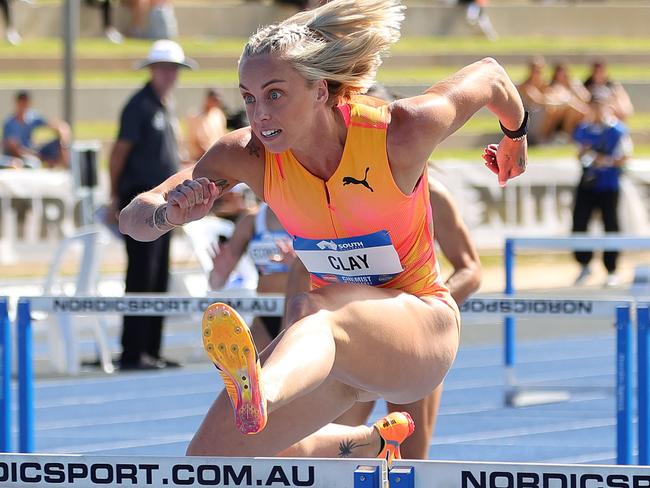
The irony is that the strategies and delivery of a brand and marketing plan that she’s learned and perfected on the job out of necessity to preserve her career could easily result in her stepping in and do that same job in sports that are flush with money.
Those salaries would dwarf the income she makes from being among the world’s best in her sport.
“I’m around the Gold Coast Suns a bit as my physio works with them and I always think an AFL club has 15 or 20 different sponsorship or wellbeing staff that help connect an athlete to wherever they want to go post-career as they have all these pathways,’’ she said.
“Whereas as Liz Clay, the pathway is really just me.”
More Coverage
Originally published as ‘Just had to take a punt on myself’: How Liz Clay quit day job, grew personal brand to fund Olympic dream





